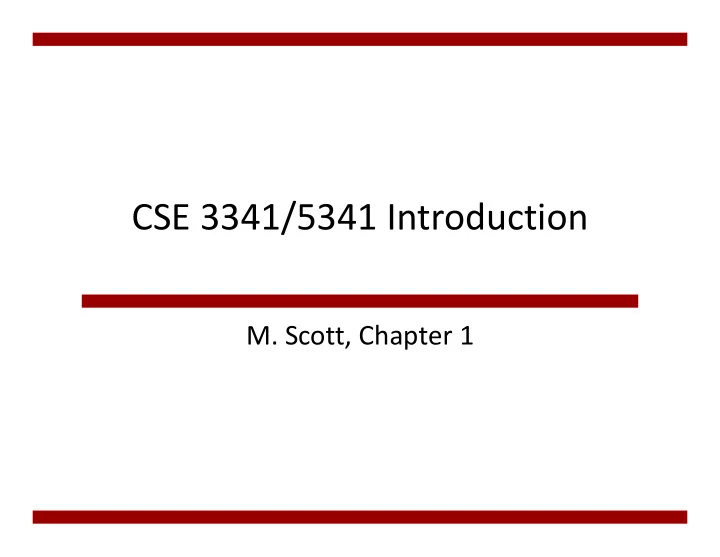

CSE 3341/5341 Introduction M. Scott, Chapter 1
Objectives • 3341: Principles of Programming Languages • Master important concepts for PLs • Master several different language paradigms – Imperative, object ‐ oriented, functional • Master some implementation issues – You will have some idea how to implement compilers and interpreters for PLs • Other related courses – 6341: Foundations of Programming Languages – 5343: Compiler Design and Implementation 2
Programming in Machine Code • Too labor ‐ intensive and error ‐ prone • Euclid’s GCD algorithm in MIPS machine code • Assembly lang – Mnemonics – Translated by an assembler 3
Evolution of Programming Languages • Hardware • Machine code • Assembly language • Macro assembly language • FORTRAN, 1954: first machine ‐ independent, high ‐ level programming language – The IBM Mathematical FOR mula TRAN slating System • LISP, 1958 ( LIS t P rocessing) • ALGOL, 1958 ( ALGO rithmic L anguage) • Many hundreds of languages since then 4
Incomplete History 5
Why So Many Programming Languages? • Evolution of language features and user needs – Control flow: goto vs. if ‐ then , switch ‐ case , while ‐ do – Procedures (Fortran, C) vs. classes/objects (C++, Java) – Weak types (C) vs. strong types (Java) – Memory management: programmer (C, C++) vs. language (Java through garbage collection) – Error conditions: error codes (C) vs. exceptions and exception handling (C++, Java) 6
Why So Many Programming Languages? • Different application domains require different specialized languages – Scientific computing (Fortran, C, Matlab) – Business applications (Cobol) – Artificial intelligence (Lisp) – Systems programming (C, C++) – Enterprise computing (Java, C#) – Web programming (PHP, JavaScript) – String processing (AWK, Perl) 7
Programming Languages Spectrum • Imperative languages – What are the steps the computer should follow in order to achieve the programmer’s goals? – “Prescriptive” attitude – Traditional (non ‐ object ‐ oriented) imperative; object ‐ oriented • Declarative languages – What are the properties of the desired? – “Descriptive” attitude – higher level of abstraction – Often, lower performance than imperative languages – Functional; logic • The lines are blurred – e.g., F# 8
Example: Euclid’s GCD Algorithm int gcd(int a, int b) { C : First, compare a and b . If they while (a != b) { are equal, stop. Otherwise, … if (a > b) a = a – b; assign to a … assign to b … else b = b – a; Scheme : same as a math definition } { a if a=b return a; gcd(a,b) = gcd(b,a ‐ b) if a>b } /* C procedure */ gcd(a,b ‐ a) otherwise (define gcd (a b) (cond ( (= a b) a ) ( (> a b) (gcd (– a b) b) ) ( else (gcd (– b a) a) ) )) ; Scheme function 9
Programming Languages Paradigms • (Non ‐ OO) Imperative (Fortran, C, Pascal) – Underlying model: von Neumann machine – Primary abstraction: procedure • Object ‐ oriented (Smalltalk, C++, Java, C#) – Underlying model: object calculus – Primary abstraction: class or object • Functional (Lisp, Scheme, ML, Haskell) – Underlying model: lambda calculus – Primary abstraction: mathematical function • Logic (Prolog) – Underlying model: first ‐ order logic 10
Why Study Programming Languages? • Choose the right language for the job – They all have strengths and weaknesses • Learn new languages faster – This is a course on common principles of PL • Understand your tools better – Compilers, interpreters, virtual machines, debuggers, assemblers, linkers • Write your own languages – Happens more often than you’d think! • To fix bugs & make programs fast, often you need to understand what’s happening “under the hood” 11
Implementation Methods • Compilation (C, C++, ML) • Interpretation (Lisp) • Hybrid systems (Java) 12
Intermediate Languages for Portability • Java: the translator produces Java bytecode – Executed on the Java Virtual Machine (JVM) – Inside the JVM, there is a bytecode interpreter and a just ‐ in ‐ time (JIT) compiler (triggered for “hot” code) – Android: Java bytecode Dalvik bytecode, for execution on the Dalvik Virtual Machine • C can be used as an intermediate language: a C compiler is available on pretty much any machine 13
Recommend
More recommend